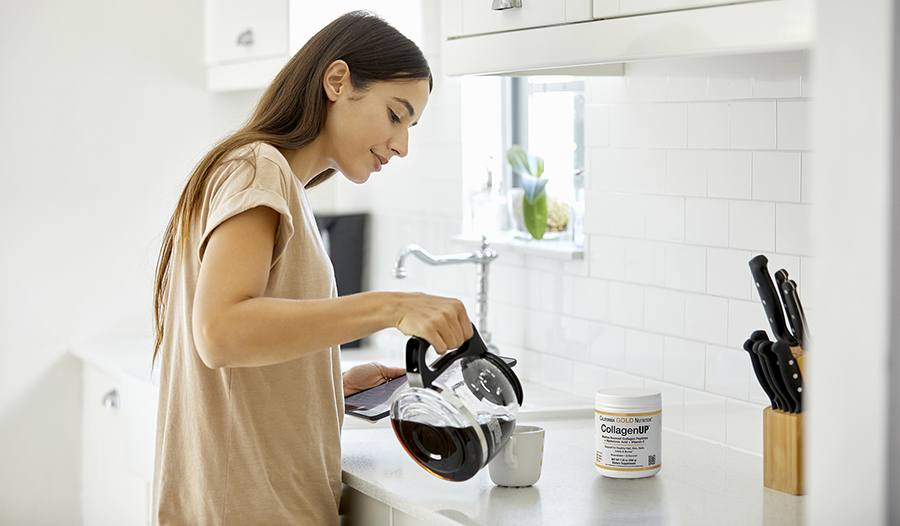Why We’re Adding Collagen to Our Coffee for Gut and Skin Health Benefits

Collagen is your body’s structural protein. Your hair, nails, skin, muscles, bones, cartilage, tendons, and organs are composed of collagen. Your body makes collagen, and you also get it from your diet, but the body slowly loses the ability to replace new collagen protein as you age.
Collagen supplements are generally composed of collagen peptides, which are smaller units of collagen protein for better absorption and utilization. Supplementing with collagen peptides has become a popular strategy to help you better absorb collagen, keep you looking young, keep your joints healthy, and improve your gut health. This article will review all that you need to know about collagen and whether you should start your day by adding collagen to your morning cup of coffee.
What Is Collagen?
There are 28 different types of collagen in the human body, with about 80–90% of the collagen in the body consisting of Types I, II, III, IV, and V. The locations of these types of collagens are as follows:
- Type I is found in tendons and bones and makes the structure of organs.
- Type II is found in cartilage.
- Type III is found in tissue that helps support many organs, like the fascia that covers muscles, or many organs.
- Type IV makes up the foundation of organs.
- Type V is a very strong type that makes up hair and nails.
Collagen protein is packed into long strand fibers that act as the foundation and supporting structures your cells lay on top of, which is known as the basement membrane. The more organized the collagen fiber is, the firmer the structure is. As you age, the amount of collagen decreases, and its organization becomes more chaotic. This is what leads to wrinkles as you age or joints losing their flexibility. Collagen protein is also referred to as collagen peptides, and the terms will be used interchangeably henceforth.
Remember that your body makes the collagen it needs. To have enough collagen though, you must have plenty of vitamin C since it is essential in the synthesis of collagen. According to a systematic review in The Orthopedic Journal of Sports Medicine, supplementing with vitamin C has the potential to accelerate bone healing after fractures as it further promotes the synthesis of collagen.
3 Key Benefits of Collagen
There are vast benefits of collagen peptide supplementation since collagen is found in so many parts of the body. We will review the organ systems that recent studies have found to benefit from collagen peptide supplementations.
Skin and Hair
The benefits of collagen peptides became evident with topical collagen creams used in anti-wrinkle creams. However, taking collagen peptides internally has proven even more effective. In a systematic review in the Journal of Drugs in Dermatology, researchers concluded that oral collagen peptide supplementation of 3–4 grams per day produced improved skin elasticity, hydration, and density of dermal collagen. Therefore, taking oral collagen peptides may help keep your skin looking younger by promoting the production of the proteins that form the structure of many layers of your skin. Finally, oral supplementation has also been shown to help promote significant hair growth in women with thinning hair.
Joint and Bone Health
Collagen protein supplementation has been shown to help promote joint health. Taking collagen orally has been shown to be absorbed by the intestines and accumulate in the cartilage and promote cartilage cells, known as chondrocytes, to synthesize the structures that make up joints.
A randomized controlled trial conducted by Clark et al. studied one group of athletes supplementing with collagen peptides for 24 weeks vs a control group who received a placebo. The results demonstrated that the athletes supplementing with collagen peptides had improvement in the five parameters assessed including joint pain when walking, joint pain when standing, joint pain at rest, and joint pain when carrying objects and lifting.
This is great news for many who have joint pain and mobility problems as these can be debilitating for many and decrease their quality of life. By supplementing with collagen peptides, people who suffer from joint pain may see an improvement in their mobility and joint pain.
As previously stated, Type I collagen is the predominant type of collagen protein that makes up your bones. In addition to supplementing with vitamin C to help the synthesis of collagen in bones, a randomized control study by König et al. found that in the postmenopausal women with reduced bone mineral density, the 66 women who supplemented with collagen peptides had increased bone mineral density compared to the 65 women in the control group. This means that supplementing with collagen peptides may improve bone strength in addition to supplementing with vitamin C, vitamin D, and calcium, especially in postmenopausal women whose bone health may not be as it was once.
Gut Health
The proverbial saying “you are what you eat” comes to mind when supplementing with collagen peptides. In addition to the benefits of collagen supplementation to nails, skin, and bones, it is believed that collagen supplementation may improve gut health. Keep in mind that many of the collagen peptides consumed are absorbed by your intestinal cells. Therefore, it is important to keep these cells as healthy as possible to have a stable gut microbiome and have a healthy intestinal structure, especially in individuals who suffer from chronic intestinal conditions.
Adding Collagen to Your Coffee
Collagen protein has a neutral taste. Therefore, many manufacturers have formulated a variety of powders, including coffee creamers, that can boost the health benefits of your morning cup of coffee. Coffee consumption has been found to have many potential health benefits including improved blood sugar control, improved memory, antioxidants, and it’s safe when consuming up to four cups of coffee per day.
Although this on paper seems like a great time-saving idea, we need to consider the perfect temperature at which collagen and proteins are viable. The temperature that collagen starts to denature is just above body temperature, 37 degrees Celsius, with the unfolding of proteins starting even as low as 36 degrees Celsius. This may seem counterintuitive as a protein that is the structural protein to have an equilibrium temperature of just below our body temperature. But this is nature's way of making the body continually remodel this protein since it is exposed to constant stress day in and day out.
So, should you add collagen to your morning cup of coffee? Unfortunately, to make the perfect cup of coffee, the water temperature needs to be around 90.5 to 96.1 degrees Celsius. This is more than twice the temperature at which the collagen protein is stable, and at these high temperatures, the protein will start to denature or begin to cook. Think about it as of raw egg hitting a frying pan. Although it's still an egg, the protein has undergone a different change and is unable to go back to its former structure. The same is found with collagen. So, if you want to enjoy the full benefits of collagen peptides and coffee, it's recommended that you drink your coffee cold to maintain the collagen’s structural integrity. You can also add collagen to other foods such as smoothies, yogurt, acai bowls, or protein shakes.
A Match Made in Heaven
Collagen peptides and coffee together have a variety of health benefits from your hair to your toes. Remember that, to get the full benefit of collagen peptides, consume them in drinks or foods below body temperature. Below is an easy cold brew collagen recipe that I frequently use.
Cold Brew and Collagen Recipe
Ingredients:
- 8 ounces of freshly brewed coffee or 2 shots of espresso
- 4 ounces of your favorite milk
- Agave sweetener, coconut sugar, or favorite sweetener.
- 1 scoop (10 grams) collagen protein
- Ice
- Cinnamon
Instructions:
- Start with 8 ounces of your freshly brewed coffee or, if you prefer, 2 shots of espresso.
- Add agave or brown sugar to taste while coffee is hot to better dissolve the sweetener.
- Add 4 ounces of almond milk or your favorite type of milk.
- Add ice to cool before adding the collagen powder.
- Once cooled, add 1 scoop (about 10 grams) of your favorite collagen powder.
- Top with a dash of cinnamon and enjoy.
References:
- Ricard-Blum S. The collagen family. Cold Spring Harb Perspect Biol. 2011;3(1):a004978. Published 2011 Jan 1. doi:10.1101/cshperspect.a004978
- Collagen. Physiopedia. https://www.physio-pedia.com/Collagen. Accessed March 30, 2022.
- DePhillipo NN, Aman ZS, Kennedy MI, Begley JP, Moatshe G, LaPrade RF. Efficacy of Vitamin C Supplementation on Collagen Synthesis and Oxidative Stress After Musculoskeletal Injuries: A Systematic Review. Orthop J Sports Med. 2018;6(10):2325967118804544. Published 2018 Oct 25. doi:10.1177/2325967118804544
- Choi FD, Sung CT, Juhasz ML, Mesinkovsk NA. Oral Collagen Supplementation: A Systematic Review of Dermatological Applications. J Drugs Dermatol. 2019;18(1):9-16.
- Glynis A. A Double-blind, Placebo-controlled Study Evaluating the Efficacy of an Oral Supplement in Women with Self-perceived Thinning Hair. J Clin Aesthet Dermatol. 2012;5(11):28-34.
- Bello AE, Oesser S. Collagen hydrolysate for the treatment of osteoarthritis and other joint disorders: a review of the literature. Curr Med Res Opin. 2006;22(11):2221-2232. doi:10.1185/030079906X148373
- König D, Oesser S, Scharla S, Zdzieblik D, Gollhofer A. Specific Collagen Peptides Improve Bone Mineral Density and Bone Markers in Postmenopausal Women-A Randomized Controlled Study. Nutrients. 2018;10(1):97. Published 2018 Jan 16. doi:10.3390/nu10010097
- Song W, Chen Q, Wang Y, Han Y, Zhang H, Li B. Identification and Structure-Activity Relationship of Intestinal Epithelial Barrier Function Protective Collagen Peptides from Alaska Pollock Skin. Mar Drugs. 2019;17(8):450. Published 2019 Jul 31. doi:10.3390/md17080450
- Leikina E, Mertts MV, Kuznetsova N, Leikin S. Type I collagen is thermally unstable at body temperature. Proc Natl Acad Sci U S A. 2002;99(3):1314-1318. doi:10.1073/pnas.032307099
- Poole R, Kennedy OJ, Roderick P, Fallowfield JA, Hayes PC, Parkes J. Coffee consumption and health: umbrella review of meta-analyses of multiple health outcomes [published correction appears in BMJ. 2018 Jan 12;360:k194]. BMJ. 2017;359:j5024. Published 2017 Nov 22. doi:10.1136/bmj.j5024
DISCLAIMER:This Wellness Hub does not intend to provide diagnosis...
















































































 Table of Contents
Table of Contents















